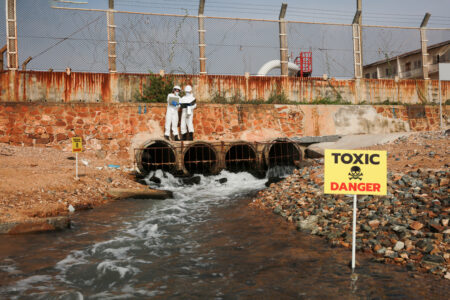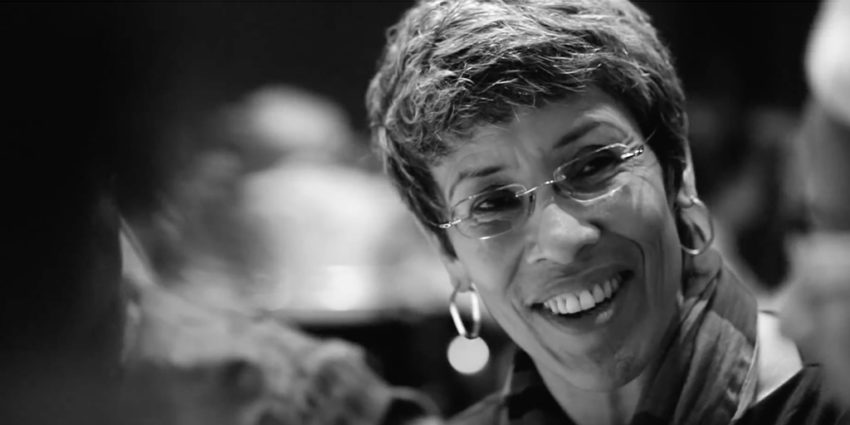
Share On Social!
In 2006, Dr. Susan E. Pacheco experienced a stark paradigm-shift due to an inconvenient truth.
She learned that the Earth—and those who inhabit it—could experience destruction and devastation at the hands of climate change. Once Pacheco gained that understanding, she says the only thing left to do was to act.
“It’s just the knowledge,” Pacheco said. “Just knowing that this is happening and that medical students, residents, and doctors don’t have the benefit of that knowledge. I have to do something. I just can’t sit and keep this knowledge to myself.
“That’s why I’ve been so engaged in educational activities that have to do with climate education because it cannot be ignored.”
Introduction to Helping others Through Healthcare
Pacheco is one of the few people who knew what she wanted to do professionally from a young age.
In elementary school, she first realized her dream of becoming a physician, which set the course of her entire life. This discovery came from an unlikely place — a European musician, writer, theologian, and physician.
Albert Schweitzer, a Nobel Peace Prize recipient, was classically trained as an organist, but eventually decided to pursue a career in medicine at age 30. He went on to continue that work in French Equatorial Africa, what is now free and independent Gabon. 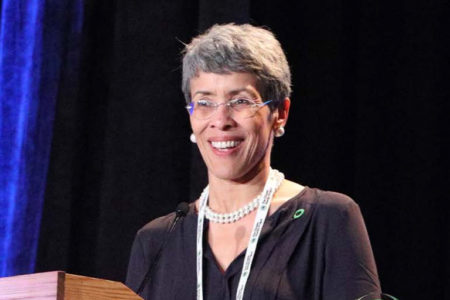
Pacheco says learning of Schweitzer’s story and desire to help others was the inspiration that drove her work.
“I remember the day,” Pacheco said. “I can see the picture of him and reading that story and just saying, ‘Ah, this is what I’m going to do.’ So, here I am.”
Moreover, Pacheco learned how to adapt at a very young age.
Originally from Puerto Rico (99% Latino), she gained this skill through much exposure to various parts of the island, due to frequent family moves because of her father’s job.
“I had to grow,” Pacheco said. “We were never more than three years in a given place. Elementary school was in once place, then middle school in another, and then high school in another. That’s how we lived.”
Along with the desire to fulfill aspirations, this education in resiliency led to her rise through the academic ranks — earning a Ph.D. from the University of Puerto Rico. Only a few years later, Pacheco and her husband moved to Texas, where she completed her residency and fellowship at the Baylor College of Medicine.
Education on Medical Industry and Climate Change
In 2007, Pacheco settled in the place she still calls home — Houston (44.5% Latino), where she is an associate professor at the McGovern Medical School at UTHealth.
She chose to work for a university hospital because she wanted to work at a place where all patients have equal access to care.
“I never wanted to be placed in a position where I had to decide if patients could or could not see me based on their insurance,” Pacheco said. “Here, we take [as many] populations that need help [as possible]. What drives me is a humbling process where I can make a difference, one patient at a time.”
Working as an immunologist, she has had a lot of exposure to many different people who come from backgrounds as varied as their specific sicknesses.
Still, it’s the desire to leave people better than she found them that keeps Pacheco going — even in the face of an unsuccessful effort. 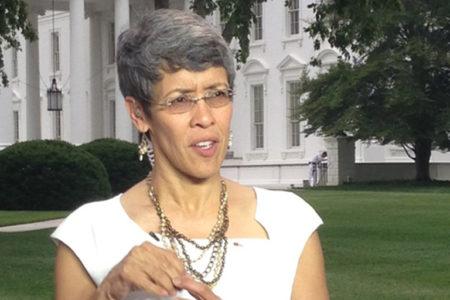
“I tell my students, ‘At the end of the day, what the parent of a very sick child who might die remembers is the compassion that their healthcare team brought to their lives,’” Pacheco said.
This perspective—one geared toward humanism—that made one film influence the direction of Pacheco’s personal and professional life.
In 2006, she and her family went to see “An Incontinent Truth” in theaters.
This documentary, which illustrated the consequences of wide-spread greenhouse gas emissions, made an indelible impact.
“I remember being struck by lightning,” Pacheco said. “I always thought I was a compassionate, good pediatrician, but I completely ignored this problem. It was my second life-changing experience.
“Ever since, I’ve been working in the education process — trying to build awareness about climate change, but specifically in the context of health. At that time, we did not talk about health and climate change. Everything else—the polar bears, the ice caps—was discussed, but one thing I was very aware of was how climate change impacts health, and I wanted to bring that out.”
In 2006, healthcare professionals rarely talked about the issue, according to Pacheco, something that did not sit right with her.
Staying the Course to Influence Climate Action
The aspect of this issue that matters to Pacheco is the communities that climate change will severely impact.
Latinos, who are and will continue to experience the worst consequences of this issue, are one of Pacheco’s primary focus.
“Our Latino population, of course, is a vulnerable population,” she said. “It has increased the urgency I have. Let’s say there’s a hurricane. [Some] could get in a car, get out of town, and stay in a hotel, but most [Latino] people can’t.
“We know that there is a majority of Latinos that live in places that are very vulnerable to climate change. So, that brings a sense of urgency that we need to get this information out. First, so that people can protect themselves, and, second, so that we can mobilize people to be more proactive.”
Still, coming from a background in pediatrics, Pacheco truly fears for those who are just coming into the world.
“The most alarming thing is the vulnerability of children,” she said. “What bothers me, what concerns me, what keeps me up pondering at night, is that kids are affected since they are in utero. The damage is such that we have effects that increase preterm births, in-uterine growth, autistic spectrum disorder, malignancy, behavioral problems — you name it.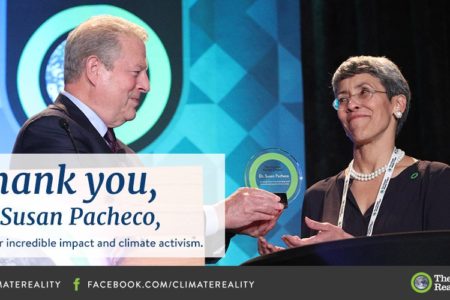
“The thing is that there are no guidelines or education initiatives to tell mothers to protect themselves. So, we’re exposed to hurricanes, pollutants, heat, smoke, to all of these things, and many are not aware that their babies are affected.”
To Pacheco, those facts are alarming.
They drove her to attend the Climate Reality Leadership Corps program in 2006. This event, led by former Vice President Al Gore, gave Pacheco the tools to begin her work.
She takes action on multiple levels for climate awareness.
Pacheco has founded organizations—such as Texas Coalition for Climate Change Awareness. She has published statements, such as her policy statement and technical report with the American Academy of Pediatrics’ Council on Environmental Health—illustrating the importance of climate change, especially in pediatric health.
She was also chosen as one of President Obama’s 2013 Champions of Change.
Moreover, Pacheco is changing the way the entire healthcare field views climate change.
Over the years, she has implemented a climate change curriculum at UT Health McGovern. Today that is her primary focus: Education and awareness.
She hopes to spread that initiative across the country.
While Pacheco said that there was much still to accomplish, the recent spike in climate change awareness, such as the worldwide climate strike, provides more fuel to keep going.
“People are starting to listen,” Pacheco said. “Even though most people don’t know the full extent, I see many groups in our communities are waking up and asking for more. It just gives us hope that something will happen and that something will be done.
“That people will start to understand and that people will start demanding — we hope.”
Editor’s Note: This article is part of a collaboration between Salud America! and the Hoffman Toxicant-Induced Loss of Tolerance (TILT) program at UT Health- San Antonio. To find out if you are TILTed due to exposure to everyday foods, chemicals, or drugs, take a self-assessment or learn more about TILT.
Explore More:
Chemical & Toxic ExposureBy The Numbers
1
Quick Survey
Can help you find out how chemically sensitive you are
This success story was produced by Salud America! with support from the Robert Wood Johnson Foundation.
The stories are intended for educational and informative purposes. References to specific policymakers, individuals, schools, policies, or companies have been included solely to advance these purposes and do not constitute an endorsement, sponsorship, or recommendation. Stories are based on and told by real community members and are the opinions and views of the individuals whose stories are told. Organization and activities described were not supported by Salud America! or the Robert Wood Johnson Foundation and do not necessarily represent the views of Salud America! or the Robert Wood Johnson Foundation.


